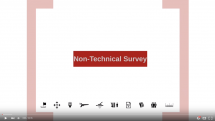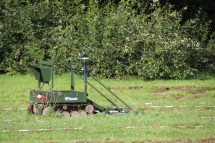Tiramisu Modules
TIRAMISU tackles the different aspects of Humanitarian Demining through the development of ten modules for end-users.
They are:
- Advanced General Survey: tools enabling the most heavily mine-infested areas of a region to be prioritised and the efficient use of the other modules in a given situation. Responsibility: Pablo Vega (EUSC).
- Non-Technical Survey & Advanced General Survey: tools to facilitate land release processes. Responsibility: Eleonore Wolff (IGEAT).
- Technical Survey: tools to detect indicators of the likely presence of landmines/UXOs. Responsibility: Matteo Zoppi (DIMEC).
- Stand-off Detection: tools to detect mines, submunitions or explosives at close range with remotely controlled Micro (Unmanned) Aerial Vehicles (MAV/UAV), remotely controlled ground platforms (UGV) or flying biosensors (honeybees). Responsibility: Lino Marques (ISR-UC).
- Ground-based Close-in Detection: tools such as advanced metal detectors, Ground Penetrating Radars and novel chemical sensors. Reponsibility: Lino Marques (ISR-UC).
- Disposal of ERW (Explosive Remnants of War): tools to protect deminers or vehicles against explosions. Responsibility: Patrycija Wojcieszynska (WITI).
- Mine Risk Education: tools to assist in Mine Risk Education activities. Responsibility: Emanuela Cepolina (PIERRE).
- Training: tools aiming to facilitate capacity building and enable the user uptake of the tools developed. Responsibility: Manuel Armada (CSIC).
- Mine Action mission management: tools to improve the planning and execution of Mine Action missions. Responsibility: Bjorn Liszka (SPINATOR).
- Standards: this module includes the current and in-progress or proposed CEN Workshop Agreements (CWA). Responsible: Yann Yvinec (RMA).
In order not only to test the modules, but to also improve the confidence of the Mine Action community in these tools, testing and validation campaigns will be organised in several mine-contaminated countries.
The project is steered by two boards, which will be involved in every stage of the TIRAMISU project's development, in order to maximise the usefulness of the modules for the Mine Action community. The End-User Board will assist in defining the needs and assessing the usefulness of these tools. The Project Advisory Board will provide an independent view on the design and development of the tools and on any ethical issues that could arise throughout the course of the project.




